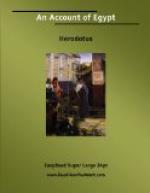are worthy of mention, they have one song, that of
Linos, the same who is sung of both in Phenicia and
in Cyprus and elsewhere, having however a name different
according to the various nations. This song agrees
exactly with that which the Hellenes sing calling
on the name of Linos, so that besides many other things
about which I wonder among those matters which concern
Egypt, I wonder especially about this, namely whence
they got the song of Linos. It is evident however
that they have sung this song from immemorial time,
and in the Egyptian tongue Linos is called Maneros.
The Egyptians told me that he was the only son of
him who first became king of Egypt, and that he died
before his time and was honoured with these lamentations
by the Egyptians, and that this was their first and
only song. In another respect the Egyptians are
in agreement with some of the Hellenes, namely with
the Lacedemonians, but not with the rest, that is to
say, the younger of them when they meet the elder
give way and move out of the path, and when their
elders approach, they rise out of their seat.
In this which follows however they are not in agreement
with any of the Hellenes,—instead of addressing
one another in the roads they do reverence, lowering
their hand down to their knee. They wear tunics
of linen about their legs with fringes, which they
call
calasiris; above these they have garments
of white wool thrown over: woolen garments however
are not taken into the temples, nor are they buried
with them, for this is not permitted by religion.
In these points they are in agreement with the observances
called Orphic and Bacchic (which are really Egyptian),
and also with those of the Pythagoreans, for one who
takes part in these mysteries is also forbidden by
religious rule to be buried in woolen garments; and
about this there is a sacred story told.
Besides these things the Egyptians have found out
also to what god each month and each day belongs,
and what fortunes a man will meet with who is born
on any particular day, and how he will die, and what
kind of a man he will be: and these inventions
were taken up by those of the Hellenes who occupied
themselves about poesy. Portents too have been
found out by them more than by all other men besides;
for when a portent has happened, they observe and
write down the event which comes of it, and if ever
afterwards anything resembling this happens, they believe
that the event which comes of it will be similar.
Their divination is ordered thus:—the art
is assigned not to any man but to certain of the gods,
for there are in their land Oracles of Heracles, of
Apollo, of Athene, of Artemis, or Ares, and of Zeus,
and moreover that which they hold most in honour of
all, namely the Oracle of Leto which is in the city
of Buto. The manner of divination however is not
established among them according to the same fashion
everywhere, but is different in different places.
The art of medicine among them is distributed thus:—each
physician is a physician of one disease and of no more;
and the whole country is full of physicians, for some
profess themselves to be physicians of the eyes, others
of the head, others of the teeth, others of the affections
of the stomach, and others of the more obscure ailments.




